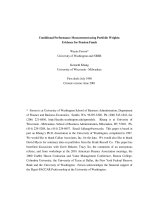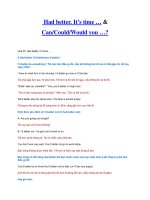Using would
Bạn đang xem bản rút gọn của tài liệu. Xem và tải ngay bản đầy đủ của tài liệu tại đây (10.54 KB, 1 trang )
Using would
The modal auxiliary verb ‘would’ has several uses. Here are a few.
Habitual action in the past
Would is used talk about habitual action in the past.
When I was a boy, I would go swimming every evening.
When we were kids, we would stay up late.
In informal writing and speech, ‘would’ is often expressed in a shortened form.
When she was at university, she’d (= she would) wake up at 4 am.
‘Would’ can also be used to refer to the future. This usually happens when we are talking about imaginary or
improbable situations.
Note that in this case, we use a past simple tense in the subordinate clause.
If I won this jackpot, I would quit my job and travel around the world. (The chances of my winning the
jackpot are pretty slim. That is why we use ‘would’ in this sentence.)
In reported speech, ‘would’ replaces ‘will’.
Direct speech: The teacher said, ‘I will punish anyone who makes a noise in the class.’
Indirect speech: The teacher said that she would punish anyone who made a noise in the class.
Direct speech: ‘Will you help me?’ asked Jane.
Indirect speech: Jane asked if I would help her.
The negative form ‘would not’ is used to talk about past refusals.
I told him not to bet on that horse, but he would not listen to me.
He wanted to sell the house, but his wife would not give her consent.
Stay on top of your writing! Download our grammar guide from www.englishgrammar.org to stay up-to-date.
Powered by TCPDF (www.tcpdf.org)









